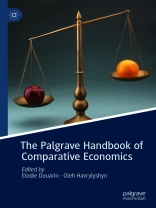This book aims to define comparative economics and to illustrate the breadth and depth of its contribution. It starts with an historiography of the field, arguing for a continued legacy of comparative economic systems, which compared socialism and capitalism, a field which some argued should have been replaced by institutional economics after the fall of the Berlin Wall. The process of transition to market capitalism is reviewed, and itself exemplifies a new combination of comparative analysis with a focus on institutional development. Going beyond, chapters broadening the application of comparative analysis and applying it to new issues and approaches, including the role and definition of institutions, subjective wellbeing, inequality, populism, demography, and novel methodologies. Overall, comparative economics has evolved in the past 30 years, and remains a powerful approach for analyzing important issues.
Inhoudsopgave
Chapter 1: Introduction to the Handbook of Comparative Economics.- Part 1: Evolution of the Field of Comparative Economics Systems.- Chapter 2: A Historiography of Comparative Economics.- Chapter 3: The Soviet Economic System: An Archival Re-Evaluation.- Chapter 4: Institutions, Institutional Systems and their Dynamics.- Chapter 5: The “New Comparative Economics” – a Critical Review.- Part 2: Comparative Economic Systems in Economic History.- Chapter 6: Comparative Economic History.- Chapter 7: The World’s First Meritocracy through the Lens of Institutions and Cultural Persistence.- Chapter 8: Institutions Matter – but so does History: A Comparison of Mediaeval Dubrovnik with other Dalmatian Cities.- Chapter 9: Long-run inequality in Communist Countries: Before, During, After.- Chapter 10: Effect of Historical Forces on liberalisation and democratisation in Transition.- Part 3: Post-Communist Transition.- Chapter 11: Thirty Years of Transition: Eleven Stylised Facts.- Chapter 12: The Importance of Domestic Commitment.- Chapter 13: Political Economy of Transition Reforms.- Chapter 14: The EU Anchor Thesis: Transition from Socialism, Institutional Vacuum and Membership in the European Union.- Chapter 15: Some Reflections on Transition: its Roots, its Complexity of the process, and Role of the IMF and other Organizations.- Chapter 16: Are the Transition Economies still in Transition?.- Chapter 17: Institutional Change in Transition: An Evolving Research Agenda.-Part 4: New Comparative Economics: Growth and formal institutions in a globalised world.- Chapter 18: Institutions, Human Capital and Economic Growth.- Chapter 19: Reform Design Matters: the Role of Structural Policies Complementarities.- Chapter 20: Democracy as a Driver of Post-Communist Economic Development.- Chapter 21: Economic Development, Transition and New Structural Economics.- Part 5: The “new”New Comparative Economics: broadening the goals.- Chapter 22: Rethinking Development: Broadening the Goals and Altering the Approach.- Chapter 23: Explaining the Heterogeneity of Health Outcomes in Post-Communist Europe.- Chapter 24: Building the Good Life: Growth, Reforms and Happiness in Transition.- Chapter 25: Growth and Subjective Wellbeing in China.- Chapter 26: Understanding Demographic Challenges of Transition through the China Lens.- Part 6: Addressing new issues by comparative analysis.- Chapter 27: Inequality and Wellbeing in Transition: linking experience and perception to policy preferences.- Chapter 28: Authoritarian Populism in Comparative Perspective.- Chapter 29: Does Emigration affect Political and Institutional Development in Migrants’ Countries of Origin?.- Chapter 30: Understanding Tax Evasion: Combining the Public Choice and new Institutionalist Perspectives.- Chapter 31: The Rules of the Game in Transition:how Informal Institutions work in South East Europe.- Chapter 32: Entrepreneurship in Comparative Economics Perspective.- Part 7: Methodologies for comparative analysis.- Chapter 33: Taxonomies and Typologies: starting to Reframe Economic Systems.- Chapter 34: Institutional Complementarities in Comparative Capitalism: a Bibliometric Account.- Chapter 35: The Challenge of Identification and the Value of Descriptive Evidence.- Chapter 36: Conclusion: So what is the new Comparative Economics now?.
Over de auteur
Oleh Havrylyshyn, Adjunct Research Professor at Carleton University, Canada, has a diverse career including Academia; Government (Deputy Minister of Finance, Ukraine); IMF senior official, advisor in many countries. His numerous writings on transition have been widely cited; the most recent Present at the Transition reflects personal insights on thirty years of post-communism.
Elodie Douarin is Lecturer in Economics at the School of Slavonic and East European Studies at UCL. She was the director of the Centre for Comparative Studies of Emerging Economies from 2016 to 2019. She holds a Ph D in Economics from Wye College (Imperial College), University of London, UK.












